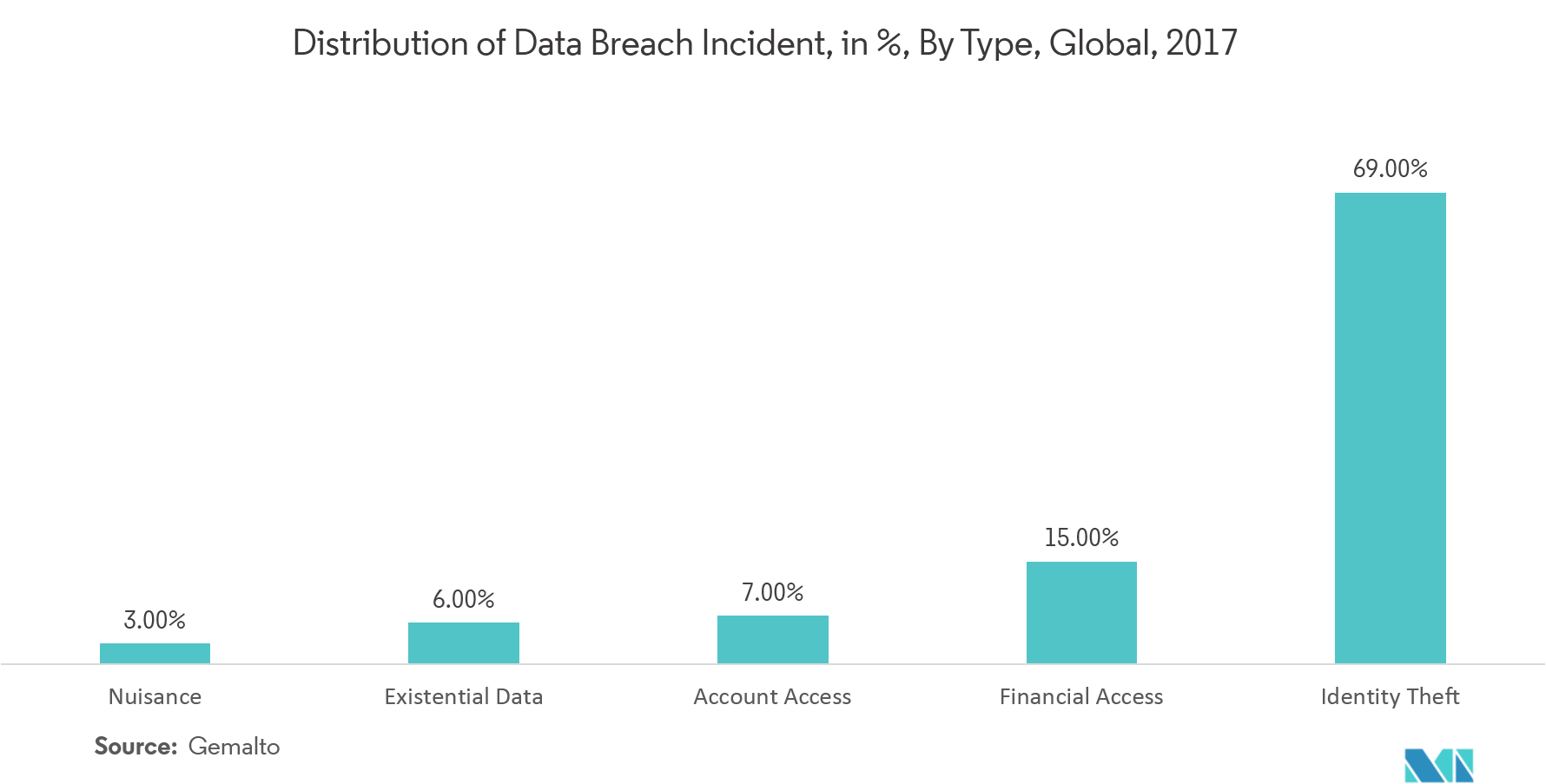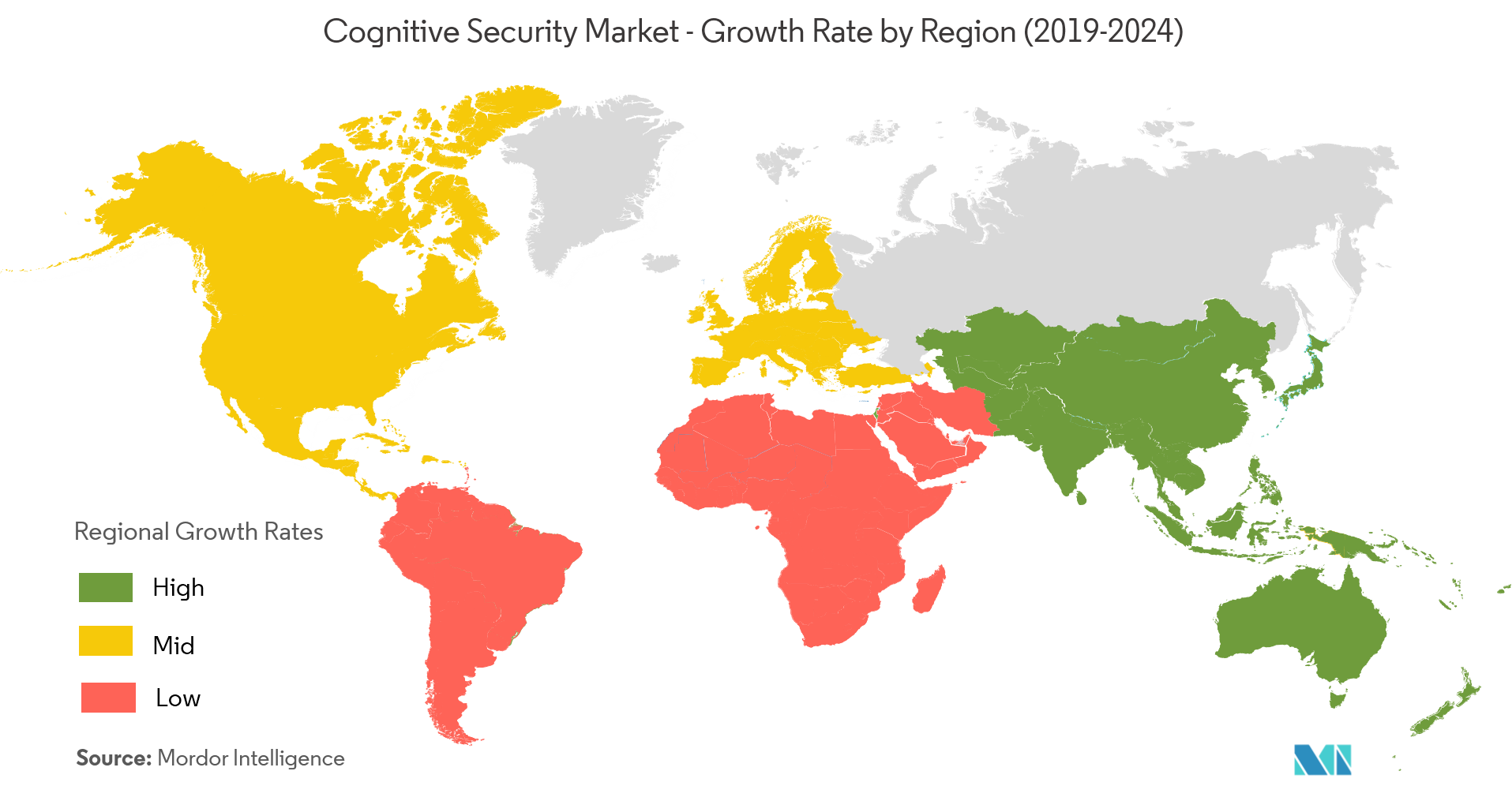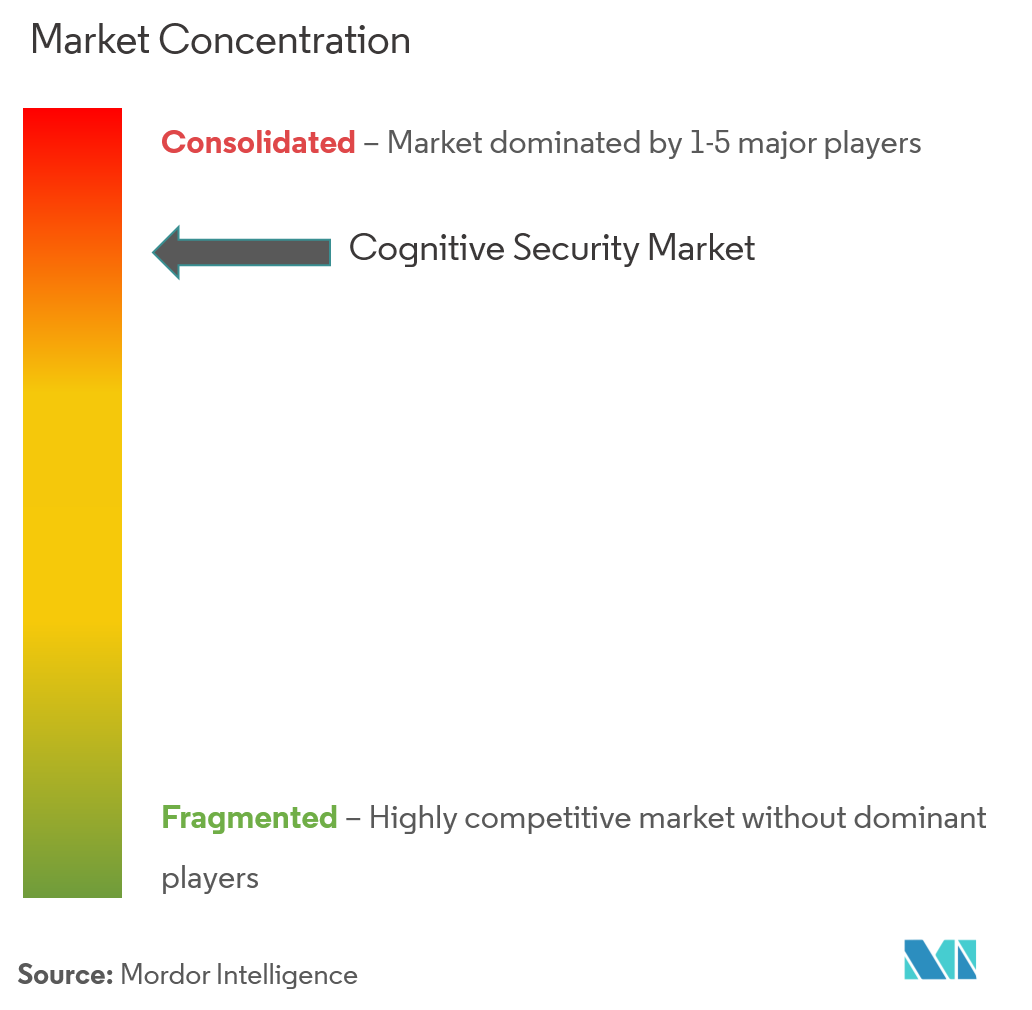Cognitive Security Market Analysis
The Cognitive Security Market is expected to register a CAGR of 23% during the forecast period.
- The growth in usage of cognitive security services for data storage of the confidential and private data of an organization with the rise in employee mobility is expected to drive the global cognitive security market. Since IT teams are struggling under the amplified workload, therefore to alleviate this additional load and allow IT to focus on delivering innovation. Introduction of new artificial intelligence and machine learning capabilities are expected to allow IT teams, to function at machine speed and scale through personalized network insights and impact the demand for such solutions in the market.
- With the increasing adoption of the cloud-based services in various business platforms have led to the need to secure the information of organizations. The implementation of cloud-based cognitive security by small and medium enterprises is increasing rapidly and fuels the growth of the market.
- IT businesses are adopting the cognitive security services for transferring huge amount of data. There is rapid adoption of the internet on smartphones in recent past which access data on the cloud, resulting in an increasing need for cloud security, thereby fueling the demand of the cognitive security market during the forecast period.
Cognitive Security Market Trends
Cognitive Threat Analytics to Grow at a Significant Rate
- Cognitive Threat Analytics relies on advanced statistical modeling and machine learning to independently identify new threats, learn from what it sees, and adapt over time. Owing to the enhanced improvements in the It security capabilities such solutions are emerging as most sought out solutions and drive the demand.
- This cloud-based solution reduces time to discovery of threats operating inside the network. It addresses gaps in perimeter-based defenses by identifying the symptoms of a malware infection or data breach using behavioral analysis and anomaly detection. With the increased pressure on the businesses to secure confidential and strategic business data, the market is expected to experience improved adoption over the forecast period.
- Moreover, it helps to improve network visibility, security, and incident response across the entire network. It correlates local traffic models with global threat behaviors to give a rich threat context around network traffic. Also, it applies machine learning and statistical modeling for encrypted traffic analytics to enhance NetFlow analysis.
North America to Hold the Largest Market Share
- High adoption of the advanced technologies, such as IoT, big data analytics, along with cloud computing is fueling the growing demand of the data security across the various end-user segment and is expected to drive the growth of the cognitive security market across the North America region during the forecast period.
- Moreover, the North America region is beholding the growing incidence of various cyber-crimes such as identity theft, phishing, along with malicious attacks that have been growing remarkably in the recent past. Major industries such as BFSI, manufacturing, retail, healthcare among others are highly susceptible to these threats.
- Organizations across the region are beginning to integrate cognitive security tools in their businesses, for instance, IBM Security is putting out products to help IT leaders equip their cognitive security operations centers (SOCs). Watson for Cyber Security is powering products such as IBM QRadar Advisor with Watson beginning to see evidence of the transformative power of this emerging technology.
Cognitive Security Industry Overview
The cognitive security market is moderately competitive and also consists of a few prominentplayers that have better brand recognition in the market. In terms of market share, some of theplayers currently dominate the market. However, with the advancement in the AI and its integration across the cybersecurityservices, new players are penetrating across the emerging regionthereby increasing their market presence as well asexpanding their business footprint across the emerging economies.
- Jun 2019 -Cisco announceditssoftware innovations designed to make managing and securing networks easier. As part of its broadened capabilities offering, Cisco is also unveiling innovations to more effectively manage users and applications across the entire enterprise networkfrom campus networks and wide-area networks to data centers and the IoT edge.
- May 2019 -Darktraceannounced that the Royal Air Forces Association (RAFA), the largest charity providing welfare support to members of the Royal Air Forces, has selected Darktrace’s cyber AI to protect its members’ sensitive data from insider threat and sophisticated attacks.
Cognitive Security Market Leaders
-
IBM Corporation
-
Trend Micro Incorporated
-
Broadcom Inc. (Symantec Corporation)
-
Cisco System Inc.
-
McAfee LLC
- *Disclaimer: Major Players sorted in no particular order
Cognitive Security Industry Segmentation
Cognitive computing uses an advanced type of artificial intelligence, thereby leveraging over various forms of AI, including machine-learning algorithms and deep-learning networks, that get stronger and smarter over time. Cognitive security is widely being adopted across a diverse set of industries for the protection of crucial information including public safety and utility companies. Cognitive security help in analyzing security developments and separate all the structured and unstructured information data into information thereby providing continuous security to business for improving its productivity.
| Deployment | On-Premise | ||
| Cloud Based | |||
| By Service | Professional | ||
| Managed | |||
| Application | Cognitive Threat Intelligence | ||
| Predictive Maintenance | |||
| Cross-Investigation Analytics | |||
| Automated compliance management | |||
| Other Applications | |||
| Geography | North America | United States | |
| Canada | |||
| Europe | United Kingdom | ||
| Germany | |||
| France | |||
| Rest of Europe | |||
| Asia-Pacific | China | ||
| Japan | |||
| India | |||
| Rest of Asia-Pacific | |||
| Rest of the World | Latin America | ||
| Middle-East & Africa | |||
Cognitive Security Market Research FAQs
What is the current Cognitive Security Market size?
The Cognitive Security Market is projected to register a CAGR of 23% during the forecast period (2025-2030)
Who are the key players in Cognitive Security Market?
IBM Corporation, Trend Micro Incorporated, Broadcom Inc. (Symantec Corporation), Cisco System Inc. and McAfee LLC are the major companies operating in the Cognitive Security Market.
Which is the fastest growing region in Cognitive Security Market?
Asia Pacific is estimated to grow at the highest CAGR over the forecast period (2025-2030).
Which region has the biggest share in Cognitive Security Market?
In 2025, the North America accounts for the largest market share in Cognitive Security Market.
What years does this Cognitive Security Market cover?
The report covers the Cognitive Security Market historical market size for years: 2019, 2020, 2021, 2022, 2023 and 2024. The report also forecasts the Cognitive Security Market size for years: 2025, 2026, 2027, 2028, 2029 and 2030.
Our Best Selling Reports
Cognitive Security Industry Report
Statistics for the 2025 Cognitive Security market share, size and revenue growth rate, created by Mordor Intelligence™ Industry Reports. Cognitive Security analysis includes a market forecast outlook for 2025 to 2030 and historical overview. Get a sample of this industry analysis as a free report PDF download.







